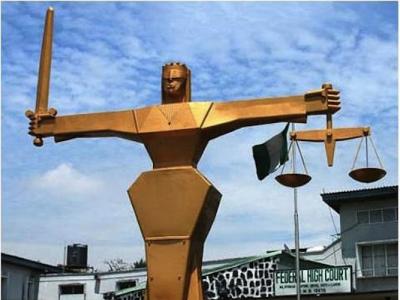A Federal High Court in Lagos has fixed May 24 for ruling in an alleged case of corruption against Christian Nwosu, an official of the Independent National Electoral Commission (INEC) charged with corruption.
The Economic and Financial Crimes Commission (EFCC) had dragged a former Minister of Petroleum Resources, Diezani Allison-Madueke, and three INEC officials to court on a seven-count charge bordering money laundering and corruption.
Allison-Madueke was however, described in the charge as “still at large’’.
The officials are: Nwosu, Yisa Olarenwaju and Tijani Bashir.
Nwosu was accused of receiving the sum of N30 million from Allison-Madueke to compromise the 2015 general elections.
He had earlier admitted collecting the money in a plea bargain arrangement with the EFCC.
However, he reneged on the agreement following the rejection of the terms of agreement by the judge.
Nwosu was then re-arraigned alongside another INEC official, Tijani Bashir, on an amended charge by the EFCC but they however, pleaded not guilty to the charge.
Following their re-arraignment, EFCC’s lawyer, Mr Rotimi Oyedepo urged Justice Mohammed Idris to transfer the case file to the Chief Judge of the court for re-assignment to another judge.
Idris said it was trite that a judge who had heard and rejected a plea bargain agreement of an accused, could no longer preside over the matter in the event that the defendant changes his plea.
He said that although the commission had full confidence in the ability of the judge to handle the case, it would be in the interest of justice to allow another judge take over the matter.
According to him, this is in line with the Provisions of Section 270(15) of the Administration of Criminal Justice Act (ACJA).
However, in his application, Nwosu urged the judge to reject EFCC’s request and continue with the matter.
Arguing the application, Nwosu’s lawyer, Mr Victor Opara said that the court had assumed jurisdiction in the matter the moment the plea of the accused was taken.
He further noted that transferring the case to another judge would slow down proceedings.
After listening to the arguments of both parties, the judge adjourned till May 24 for ruling.
The prosecution alleged that the accused committed the offence on March 27, 2015, by accepting bribe from the ex Petroleum Minister.
They were alleged to have conspired to take possession of the sum of about N264 million which sum they reasonably ought to have known formed part of the proceeds of an unlawful act of gratification.
The accused were also said to have made cash payments of the sum of about N235 million, which sum exceeded the amount authorised by Law, without going through a financial institution.
EFCC alleged that Bashir (also made a cash payment of about N70.1 million to Adedoyin without going through a financial institution and which sum exceeded the amount authorised by law
The prosecution also alleged that Bashir also directly took possession of the sum of about N165 million which sum he ought reasonably to have known formed part of an unlawful act of gratification.
In count seven, Nwosu was alleged to have directly used the sum of N30 million which he ought to have known formed part of an unlawful act of gratification.
The offences are said to have contravened the Provisions of Sections 15 (3), 16 (2) and 18 (a) of the Money Laundering Prohibition Amendment Act, 2012. (NAN)

